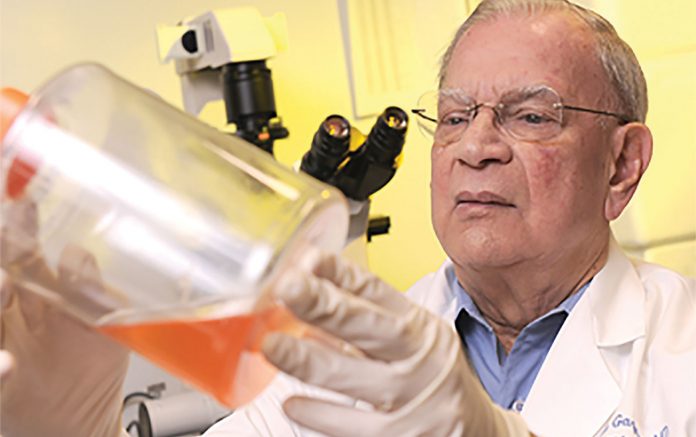Posted: March 1, 2019
Adi Gazdar, MD, a true giant in the field of lung cancer research, passed away on December 29, 2018. Dr. Gazdar was the W. Ray Wallace Distinguished Chair in Molecular Pathology Research and professor of pathology at the Hamon Center for Therapeutic Oncology Research and pathology at UT Southwestern Medical Center. Adi Gazdar was one of the first “molecular pathologists” of lung cancer and helped lead the development of this area around the world through his publications, collaborations, and mentoring activities.
As head of the Tumor Cell Biology Section at the National Cancer Institute between 1969 and 1975, Dr. Gazdar collected, cataloged, and analyzed more than 2,200 human cancer specimens, focusing on lung cancers and lymphomas. After moving to UT Southwestern Medical Center, he collected and analyzed an additional 2,500 human tumor specimens. The total number of human cancer cell lines he established or helped to establish across cancer types is approximately 400—the world’s largest collection of human cancer cell lines. This work has facilitated numerous therapeutic advances and has led to the development of prognostic biomarkers in lung cancer and other cancer types. He was also a highly regarded tumor virologist, discovering the “Gazdar murine sarcoma virus” (Gz-MSV); his development of two human T-cell lymphoma lines led to the discovery of one of the of the first human retroviruses (HTLV-1); the other line was crucial for the initial isolation and characterization of the human HIV-AIDS virus.
Dr. Gazdar was an exceptional clinical and molecular pathologist. He played a critical role in the IASLC pathology panel/committee, which set the standards for the pathologic classification of human lung cancers. Dr. Gazdar was an active member of the IASLC for more than 35 years; he also served on the IASLC Board of Directors. In 2003, he was awarded the Mary J. Matthews Pathology/Translational Research Award for his scientific achievements in thoracic pathology research. Dr. Gazdar was an exceptional mentor, training numerous fellows in lung cancer biology and pathology. In 2015, the IASLC Adi Gazdar Lectureship Award for Translational Research was established through a generous donation from Dr. Gazdar and his wife Celia; this award allowed funding for several fellowships. “This award is a testimony to Adi’s commitment to the training of the next generation of translational molecular pathologists in lung cancer; he was an outstanding educator and mentor,” said Dr. Ignacio I. Wistuba, chair of Translational Molecular Pathology at The University of Texas MD Anderson Cancer Center, who is a former trainee and long-term collaborator of Dr. Gazdar.
“Dr. Gazdar’s contribution to lung cancer biology is of tremendous significance through establishment of NSCLC and SCLC cell lines and through other studies on which he led and participated,” said Fred R. Hirsch, MD, PhD, who is Executive Director for the Lung Cancer Institute at Mount Sinai. Dr. Hirsch, who was IASLC CEO from 2013 to 2018 and has been an active member of the society for 41 years, noted that Dr. Gazdar was a wonderful mentor to him throughout his career. “Dr. Gazdar was a unique human being with much wisdom, even beyond the scientific sphere. His interest in history and global cultures was both unique and engaging and made him an exceptionally interesting travel partner. He was liked by everyone, and he will be deeply missed.”
With more than 700 publication credits, the Institute for Scientific Information includes Dr. Gazdar in a list of the world’s most cited authors (88,255 citations with an h-index of 147) —comprising less than 0.5% of all authors of published research—based on the important scientific developments of the past 2 decades.
Dr. Gazdar was extremely active in ongoing lung cancer research up until the time of his death, generating exciting new findings in subclasses of SCLC. He was a true gentleman as well as scientist and mentor. His soft-spoken and even-tempered manner was an inspiration among scientists. John Minna, MD, professor and director of the Hamon Center for Therapeutic Oncology Research, Internal Medicine, and Pharmacology, worked with Dr. Gazdar for decades. “He stimulated collaborations worldwide, and always said exactly what he thought about data or hypotheses, even if these ran against general thinking,” Dr. Minna told the IASLC Lung Cancer News. “Of course, in nearly every case, he was also right.” Dr. Gazdar is survived by his wife of 49 years, Celia Gazdar. The lung cancer community is saddened by the loss of this giant in the study of lung cancer. ✦











